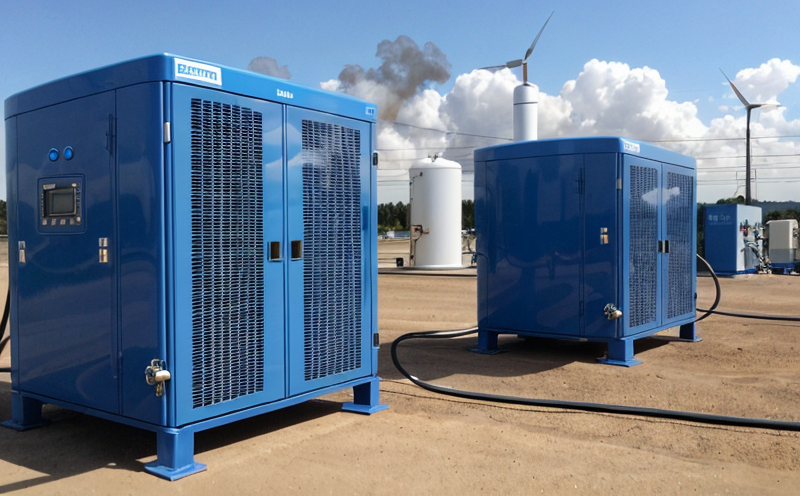Hydrogen Energy Certification and Testing: Ensuring Safety and Efficiency
As the world transitions towards cleaner and more sustainable energy sources, hydrogen has emerged as a promising alternative to fossil fuels. Hydrogen energy, when used in fuel cells or internal combustion engines, offers several advantages, including zero greenhouse gas emissions and high energy density. However, the widespread adoption of hydrogen energy is contingent upon its safe and efficient production, storage, transportation, and usage. To address these concerns, various certification and testing standards have been developed to ensure that hydrogen energy systems meet specific safety and performance requirements.
Hydrogen Energy Certification Overview
Certification of hydrogen energy systems involves a series of tests and evaluations that assess their compliance with established standards and regulations. The primary goal of certification is to guarantee the safety and efficiency of hydrogen energy systems, thereby minimizing risks associated with their operation. There are several certification bodies and organizations worldwide that offer hydrogen energy certifications, including the following:
International Organization for Standardization (ISO)
American Society of Mechanical Engineers (ASME)
National Fire Protection Association (NFPA)
American Society for Testing and Materials (ASTM)
Hydrogen Energy Testing Standards
Testing standards for hydrogen energy systems encompass various aspects, including safety, performance, and durability. Some key testing standards include:
Material compatibility: Assessing the chemical compatibility of materials used in hydrogen energy systems with hydrogen gas.
Examples:
- ISO 11180:2014 - Hydrogen fuel cell vehicles - Material requirements for onboard storage tanks
- ASME B31.12-2018 - Hydrogen Piping and Pipelines Code
Pressure vessel integrity: Evaluating the strength and durability of pressure vessels used in hydrogen gas storage.
Examples:
- ASME Section VIII Div. 1:2019 - Boiler and Pressure Vessel Code, Division 1
- EN 13923:2004 - Gas cylinders - Fittings with internal threads for full-threaded valves (ISO 11113)
Leakage and gas flow testing: Assessing the integrity of piping systems, valves, and fittings used in hydrogen energy applications.
Examples:
- ISO 13752-1:2015 - Hydrogen refuelling stations - Part 1: Installation, maintenance and operation requirements
- NFPA 2-2020 - Standard for the installation of stationary propane fuel systems
Testing Methods and Protocols
Hydrogen energy testing involves a range of methods and protocols to assess various aspects of system performance. Some common testing methods include:
Material testing: Evaluating material properties, such as tensile strength, hardness, and impact resistance.
Mechanical testing: Assessing the structural integrity of components under mechanical loads, including pressure, temperature, and vibration.
Thermal testing: Evaluating thermal performance characteristics, including heat transfer rates, thermal conductivity, and insulation effectiveness.
QA Section
Q: What is the primary goal of hydrogen energy certification?
A: The primary goal of hydrogen energy certification is to ensure that systems meet specific safety and performance requirements, thereby minimizing risks associated with their operation.
Q: Who are some key certification bodies for hydrogen energy systems?
A: Some key certification bodies include the International Organization for Standardization (ISO), American Society of Mechanical Engineers (ASME), National Fire Protection Association (NFPA), and American Society for Testing and Materials (ASTM).
Q: What are some key testing standards for hydrogen energy systems?
A: Key testing standards include material compatibility, pressure vessel integrity, leakage and gas flow testing, and thermal performance.
Q: What types of materials are used in hydrogen energy applications?
A: Commonly used materials include high-strength steel alloys, advanced composites, and polymers with specific properties to withstand chemical exposure and mechanical loads.
Q: How is material compatibility tested for hydrogen energy systems?
A: Material compatibility testing involves evaluating the chemical interaction between materials and hydrogen gas under various conditions, including temperature, pressure, and humidity.
Q: What are some potential risks associated with hydrogen energy systems?
A: Potential risks include explosions, fires, toxic gas leaks, and system failure due to mechanical or material defects.
Q: How can certification ensure the safe operation of hydrogen energy systems?
A: Certification ensures that systems meet established safety standards, which in turn minimizes risks associated with their operation. Regular inspections and maintenance also play a critical role in ensuring system integrity.
Q: Can hydrogen energy systems be designed for both stationary and mobile applications?
A: Yes, hydrogen energy systems can be designed for both stationary (e.g., power generation) and mobile applications (e.g., fuel cell vehicles).
Q: What are some ongoing research areas related to hydrogen energy certification and testing?
A: Ongoing research areas include advanced materials development, system optimization, and improved testing methods for enhanced efficiency and safety.
This article provides a comprehensive overview of hydrogen energy certification and testing. By understanding the various standards and protocols involved in this process, stakeholders can ensure that hydrogen energy systems meet specific requirements for safe operation and efficient performance.

































